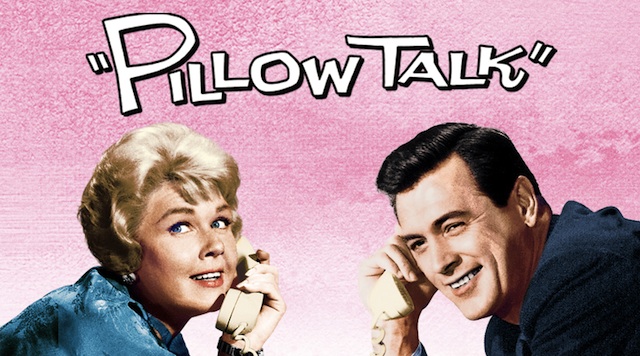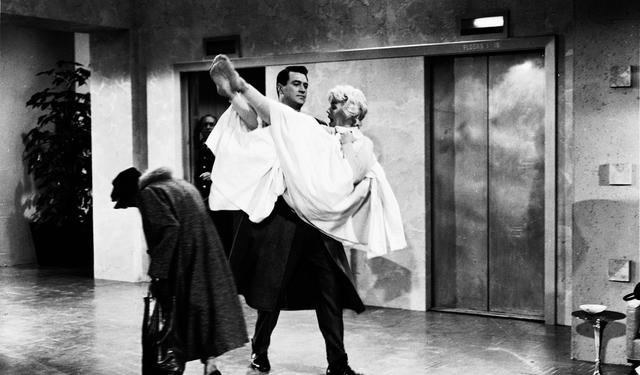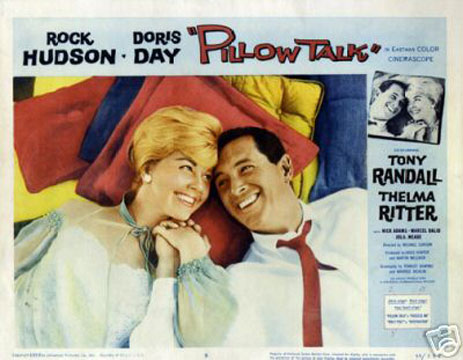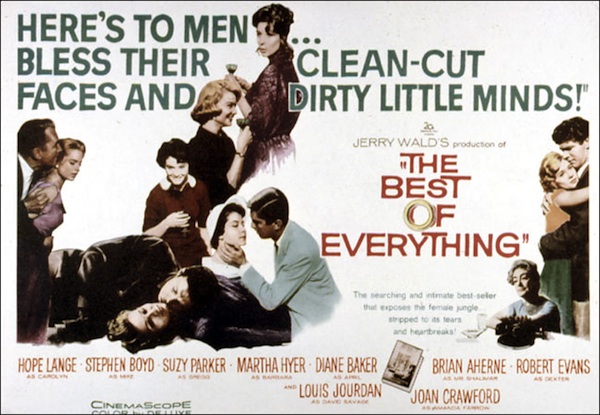
As part of my continuing series looking back at some of Universal Studios’ 100 year old back catalog, I will now focus on the 1959 romantic comedy Pillow Talk.
Here’s the setup: Jan Morrow (Doris Day), is a very successful interior designer who shares a Manhattan party line (look it up, folks) with equally successful Broadway composer, man-about-town and all around ladies’ man, Brad Allen (Rock Hudson). Much to Jan’s irritation, Brad is constantly engaged on the line and in a funny sequence, we hear the little ditty he sings to each of his paramours by simply swapping out their respective names in the lyrics.
As if that were not annoying enough, she has to bat away the advances of one of her clients, the wealthy Jonathan Forbes (Tony Randall). Jonathan, not knowing that there is a connection between the two, turns to his dear friend Brad airing his grievances about Jan. Brad, of course, recognizes the name and proceeds to prod his buddy to tell him more. In a phrase, he likes what he hears. In fact he is so intrigued that he attempts (unsuccessfully) to make amends with Jan, with obvious designs of seducing her, eventually. But having failed in his efforts he is left with no other recourse. Or so we are lead to think.
Later that evening, the pair just happen to be at the same nightspot. Brad hears her name, sees her (finally). But knowing that he cannot approach her as Brad Allen, he adopts the identity of Rex Stetson – Texas cattleman. The stage is set for an all-out battle of the sexes that does not necessarily go as planned, but is fun to watch.

As far as the acting is concerned, I think you get as much as one would expect from Rock Hudson and Doris Day, which is more than fine. It should be noted that Day’s acting ability often took a back seat to her dual role of ‘American Sweetheart’ and her chart-topping success as a vocalist (which is a shame). On the other side, Rock Hudson gets to turn on his Texan drawl and essentially play two characters: the debonair Manhattanite Brad and the Southern gentleman Rex. I did not think about this until I started writing up this piece, but to be able to pull off such a feat without boring your audience requires some skill. To modern audiences, Rock Hudson the actor may be easily dismissed as that guy from those 1950s romantic comedies and kitschy melodramas, but in this role there is at least evidence of solid acting bona fides (see John Frankenheimer’s Seconds for further proof). The pair’s chemistry is spot-on, and the film’s success would lead to two more films (Lover Come Back and Send Me No Flowers) and produce a lifelong friendship off-screen.
A couple of my favorite words in the acting credit rolls are THELMA RITTER. Here she plays Jan’s interfering, boozy housekeeper, Alma. For those familiar with Ritter’s work, you know well that her pithy delivery alone is worth the price of admission. She serves as the audience’s way in – and says what many of us in the audience are probably thinking.
In the role of Hudson’s second fiddle Jonathan, Tony Randall is equally affable, if not a bit annoying at times. Just the way he is supposed to be!
Pillow Talk also heavily relied on the split-screen technique, as opposed cutting to Hudson and Day separately, during their party line ‘interactions.’
And no Doris Day feature would be complete without her pleasant voice singing the signature tune:

The writing is witty and at times a bit saucy. And the cynics among us may be tempted (but should not, at least on first viewing) to pick apart every word of innuendo that comes out of Hudson’s mouth; in particular there is one scene when, in Brad’s efforts to court Jan, he essentially emasculates himself while on the phone with her. This, in fact, is a common theme of films (principally rom-coms) during this time. It is but one of several elements of Pillow Talk (including the aforementioned split screen) that Peyton Reed spoofs in 2003’s Down With Love, starring Renée Zellwegger and Ewan MacGregor.
FUN FACT (Courtesy of Wikipedia): The director, Michael Gordon is the maternal grandfather of actor Joseph Gordon-Levitt. This film marked Gordon’s return to feature film production, following his blacklist during the infamous and controversial HUAC (House Un-American Activities Committee) period.
In a world where we are offered a buffet of poorly executed, totally vapid confection and told it is a romantic comedy, I say take a look at Pillow Talk to see how it should be done.

